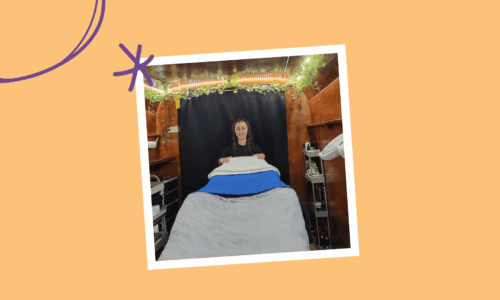
Mixed martial arts continue to gain popularity as a sport, but not everyone feels welcome in existing gym cultures. With Connection Martial Arts, Nicole Sawin is working to break down the participation barriers in mixed martial arts training by providing a space that is inclusive and accessible.
Nicole, who worked as a child and youth mental health therapist for almost seven years, brings her experience in mental health care to training on the mats. Connection Martial Arts provides its members a gym space that respects both body and mind, with martial arts programs informed by mental health considerations and trauma-informed principles.
“I’ve always had an entrepreneurial spirit. I grew up in a small town in the north with little to do, so I would end up creating my own opportunities and thinking outside the box,” says Nicole.
“I quickly noticed a large gap in the martial arts spaces in my community. I founded Connection Martial Arts because I was tired of watching people join and leave the gyms I trained at, whether that was due to mental health challenges, trauma, gender identity, or other reasons. I wanted to provide a space that allows them to benefit from what a martial arts community has to offer.”
At Connection Martial Arts, participants can access different classes with monthly memberships or punch passes. All classes integrate conditioning and technical drills with fun and fitness, and in the near future, specialized classes focusing on competition and grappling will be added to the schedule. “So it looks the same as a regular mixed martial arts gym, except the policies and the practices—how we do it—are different. Trauma-informed care means we look at our policies, procedures, and practices, and consider how things are done and how that might impact the people coming through our doors. What we focus on is choice and voice.”
Business Loans for Women Business Owners in BC
Nicole found out about WeBC’s funding program through a Google search while looking for accessible institutions that offer business loans. As a woman under 40, she accessed the youth business loan program, which offers joint funding from WeBC and Futurpreneur Canada. Alongside financial help, the loan program includes complimentary services aimed at empowering women to develop and strengthen their businesses.
“My business plan is all completed now, and the templates that WeBC provided—like their cash flow templates and business plan handouts—have been very helpful.”
Q&A
Q: What inspired you to start your business?
I think mixed martial arts in general is a space that a lot of people feel drawn to for lots of different reasons: some people are drawn to it because they have fitness goals; they want to have fun; maybe they want to compete. Some are drawn to it for really deep personal reasons, like they’re looking for self defense because they’ve had really traumatic experiences in their life and they’re looking to feel empowered again.
I saw a lot of folks walking through the doors that coaches did not have the training to know what to do to support them.
There’s a certain part of the population that has not been able to access mixed martial arts training in a safe and accessible way, so filling that gap is the foundation for what I’m doing now.
Q: How does your business impact your local community?
A: It started small in January 2023, with one class of six people that I was teaching in my basement. Now, we’re moving into a larger commercial space and I couldn’t be more excited!
Our work supports folks who have experienced really negative things in their life that impacts how their nervous system reacts to different stimuli. We offer trauma-informed martial arts training that allows our community members to feel more empowered in their bodies.
Q: What’s the biggest lesson you have learned on your entrepreneurial journey?
A: The biggest learning for me was around taking risks. I’m a fairly anxious person and I try to control everything to create outcomes that are certain. But when you’re running a business, you don’t know what the outcome will be and you have to take calculated risks to be able to make decisions and get where you want to go. So I learned to be comfortable being uncomfortable.
Q: How did the WeBC loan program support you in starting your business?
A: As somebody who’s female presenting and somebody who is relatively young to be starting a business, WeBC jumped out to me because of its great support offerings that are tailored to my needs.
The process to apply for the loan was very streamlined; I felt well-supported all the way through. The WeBC loan was really helpful because it allowed me to build a commercial space so I could expand our programs and what we can offer our students.
Q: What does the future of your business look like?
A: In the short-term, we’re very excited to get into our new commercial space. It will expand our training options and give us more room to grow.
Looking further ahead, I would like for us to become a leader in the provision of trauma-informed martial arts training. I want to contribute to research and grow our knowledge on martial arts as a clinical intervention.
What I’m most excited about is to continue working with my community to create a martial arts space that is safe and accessible for folks who don’t have other places to go.




